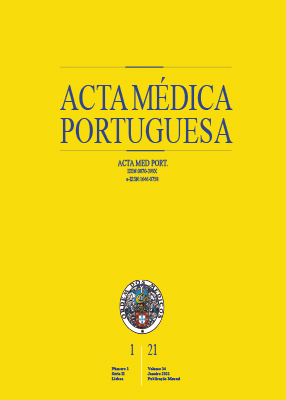Viscoelastic Tests in the Evaluation of Haemostasis Disturbances in SARS-CoV2 Infection
DOI:
https://doi.org/10.20344/amp.14784Keywords:
Blood Coagulation Disorders, Blood Coagulation Tests, Coronavirus Infections, COVID-19, SARS-CoV-2, ThrombosisAbstract
COVID-19 associated coagulopathy is a dysfunction of severe SARS-CoV-2 infection, characterized by significantly increased fibrinogen, D-dimer and C reactive protein and normal to near-normal prothrombin time, activated partial thromboplastin time and platelet count. Hypercoagulopathy and hypofibrinolysis coexist and are detected by viscoelastic tests. These features, when associated with immobilization and intrinsic risk factors (age, obesity, comorbidities, drugs) of the patient, can trigger thromboembolic events, despite thromboprophylaxis. The lungs are the first and most severely damaged organ. To date, most patients have exhibited hypercoagulability on viscoelastic tests not detected by standard coagulation tests. A high rate of thrombotic events was reported, suggesting that it should be considered as a cause of clinical deterioration in intensive care and potentially other clinical settings. In advanced stage, COVID-19 associated coagulopathy, fibrinogen and platelet count can decrease significantly, depending on the severity of clinical status resembling consumptive coagulopathy. In this stage, bleeding events can occur, especially if the patient is under extracorporeal membrane oxygenation (ECMO). Viscoelastic tests are very useful tools to assess hypercoagulability and hypofibrinolysis (not detectable by standard coagulation tests) in critically ill SARS-CoV-2 patients with COVID-19 associated coagulopathy and look like very promising tools for anticoagulation management. However, further research needs to be carried out to determine whether abnormal viscoelastic tests alone or in combination with other clinical or laboratory findings can identify patients at increased thrombotic risk. Clinical trials to evaluate hypercoagulability using viscoelastic tests and the need for personalized dosage of anticoagulation in SARS-CoV-2 patients
are quickly emerging.
Downloads
Downloads
Published
How to Cite
Issue
Section
License
All the articles published in the AMP are open access and comply with the requirements of funding agencies or academic institutions. The AMP is governed by the terms of the Creative Commons ‘Attribution – Non-Commercial Use - (CC-BY-NC)’ license, regarding the use by third parties.
It is the author’s responsibility to obtain approval for the reproduction of figures, tables, etc. from other publications.
Upon acceptance of an article for publication, the authors will be asked to complete the ICMJE “Copyright Liability and Copyright Sharing Statement “(http://www.actamedicaportuguesa.com/info/AMP-NormasPublicacao.pdf) and the “Declaration of Potential Conflicts of Interest” (http:// www.icmje.org/conflicts-of-interest). An e-mail will be sent to the corresponding author to acknowledge receipt of the manuscript.
After publication, the authors are authorised to make their articles available in repositories of their institutions of origin, as long as they always mention where they were published and according to the Creative Commons license.









